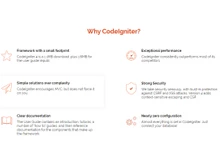PHP frameworks are widely available online, speeding up the creation of websites. Laravel and CodeIgniter are two such innovative PHP frameworks in the web development industry.
Even though both can accelerate the web development process, there are some fundamental differences between Laravel and CodeIgniter. If you're trying to figure out which PHP framework is ideal for creating your web project, here’s the full comparison of Laravel and CodeIgniter in terms of cost, ease of use, customer service, customization, platform support, and more.
CodeIgniter vs. Laravel: Overview
The open-source Laravel web framework is renowned for its server-side management of routing, templating, HTML authentication, and other features. It is coded in PHP and is built on Symfony, which offers reusable PHP components and libraries. It is based on a server-side framework that enables you to create full-stack apps, online portals, customized backends, predefined architectures, etc.
For developers who seek a straightforward and robust platform to create fully functional online apps, CodeIgniter is a powerful PHP framework having a small digital footprint. It is one of the frameworks developed in PHP that can be used to create dynamic websites. This framework supports third-party plugins that make it easier to utilize features that are complicated including MVC framework, Stack and GitHub overflow, etc.
CodeIgniter and Laravel: Pros & Cons
- Laravel performs faster than CodeIgniter in terms of loading time. This is because Laravel uses a more effective caching technology.
- Laravel and a few of Laravel alternatives include more built-in security features than CodeIgniter, including XSS filtering and CSRF protection, making it safer overall.
- Compared to CodeIgniter, Laravel offers better documentation, making it simpler to learn and use.
- Contrary to Laravel, CodeIgniter doesn't provide ORM for mapping.
- Laravel is better than CodeIgniter in terms of support as it offers more resources for learning as well as troubleshooting.
CodeIgniter vs. Laravel: In Terms of Features
In terms of features, Laravel is a winner as it offers some of the advanced-level features that are missing in CodeIgniter. For example, integrated modules, PHP 7 Support, HTTP Support, Unit Testing, and more.
- PHP 7 Support: The web application's performance is improved, and memory usage is reduced with the PHP 7 programming language. Both Laravel and CodeIgniter are compatible with PHP 7. However, when creating and testing PHP 7 apps with the CodeIgniter framework, developers often face issues.
- Built-in Modules: The built-in modularity feature in Laravel allows for the division of a bigger project into smaller modules or components with the help of bundles. These modules can then be used across several projects. However, this feature is not supported by CodeIgniter.
- Database Support: Compared to Laravel, CodeIgniter and some CodeIgniter alternatives support more databases. Both Laravel and CodeIgniter frameworks support a variety of databases, including MySQL, PostgreSQL, Microsoft Business Intelligence, and MongoDB. However, in addition to these, CodeIgniter also supports Orient dB, Microsoft SQL Server, Oracle, JDBC, and IBM DB2.
- Eloquent ORM: Eloquent ORM makes it easier to communicate with various databases. This function is supported by Laravel but not by CodeIgniter.
- Blade Template Engine: The blade template engine that comes with Laravel enables developers to improve the efficiency of the application by customizing views. However, CodeIgniter lacks a built-in template engine.
- HTTP Support: The HTTP protocol is typically used by site developers to securely send/receive sensitive information. Developers can design unique HTTP routes using Laravel. However, this feature is not offered by CodeIgniter.
- Authentication: Developers get to easily create authorization in a web application with Laravel's authentication class. However, CodeIgniter lacks this capability, so developers have to create their own CodeIgniter extensions to implement authentication.
- Unit Testing: A built-in testing tool, called PHP Unit, is included in Laravel. However, CodeIgniter does not have this testing tool.
Comparison of CodeIgniter vs. Laravel in Terms of Pricing
As Laravel and CodeIgniter are both open source, anyone can use them. However, there are certain paid commercial add-ons and extensions offered for both frameworks. For this, one can contact their sales team respectively.
CodeIgniter or Laravel: Ease of Use
In comparison to Laravel, CodeIgniter is simpler to learn. New users can easily run CodeIgniter due to its less complex syntax and fewer capabilities. On the other hand, the learning curve for Laravel is steeper, but it provides a greater range of features and capabilities.
CodeIgniter or Laravel: Customization
Both Laravel and CodeIgniter frameworks allow for extensive customization. However, Laravel still stands ahead as it has greater customization options due to its richer API. This allows users to easily add more features and extensions to Laravel.
CodeIgniter or Laravel: Platforms Supported
Both Laravel as well as CodeIgniter are web-based in nature. Therefore, all significant operating systems, including Windows, Linux, and macOS, are supported by both Laravel and CodeIgniter.
CodeIgniter or Laravel, Which Is Better?
Developers looking for a straightforward, minimalist framework with a modular architecture can opt for CodeIgniter. It is perfect for smaller projects and projects with minimal resources because it is simple to use. But compared to Laravel, CodeIgniter has fewer features and less comprehensive documentation.
On the other hand, Laravel can be chosen by developers who are looking for a feature-rich platform with an extensively documented codebase. Although it is more complicated than CodeIgniter, it offers a greater variety of functionality, such as built-in routing, authorization, and authentication. Additionally, there is a sizable and active community for Laravel, so if you require assistance, it is easy to find.


 4 Ratings & 0 Reviews
4 Ratings & 0 Reviews















